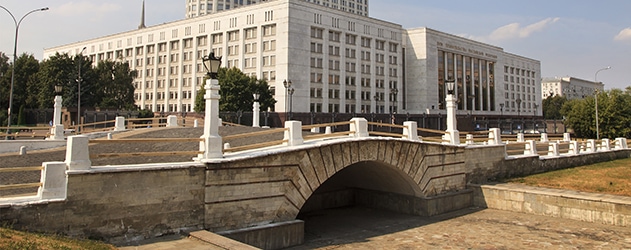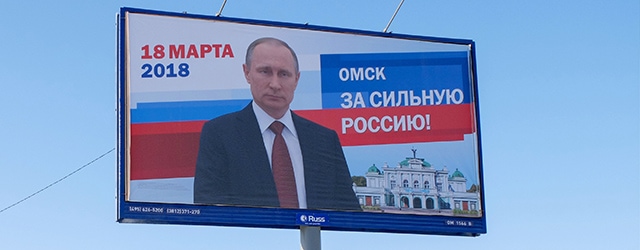Russia has stabilized itself since its 2014 break with the West—but prospects for faster growth that could attract foreign investors remain dim.

Matthias Schepp, who chairs the Russian-German Chamber of Commerce in Moscow, is an eager booster of his host country’s economy. Under Vladimir Putin’s steely gaze, he argues, Russia is moving dynamically toward an improved investment environment. The Kremlin is steadily replacing old-line governors steeped in back-scratching “banya culture” with market-oriented 30-somethings like Anton Alikhanov in Kaliningrad and Andrei Nikitin in Novgorod. Moscow, under Mayor Sergei Sobyanin, is outpacing Western cities in implementing e-government: It’s expected to be the first world metropolis fully wired to the coming 5G communications standard. German companies like Daimler and Siemens responded last year with $1.7 billion in direct investment into Russia, the highest figure since 2006.
Yet Schepp is compelled to admit some steps backward, too: such as a draconian shift in residency rules that make just staying in the country a gratuitous headache for foreign businesspeople, and a campaign to force inward investment through local-content requirements that may skirt World Trade Organization rules.
Schepp describes the dynamic that has tantalized and frustrated Russia watchers throughout the nearly three decades since Soviet Communism collapsed: an educated, innovative population itching to make a global mark, pitted against a centuries-old tradition of paralytic bureaucracy. As Putin—a former security officer and an apostle of state dominance—approaches his 20th year in power, the bureaucracy appears to be holding the high card. Russia, which once was expected to gallop alongside China and India as a lead horse for the 21st-century economy, has fallen far off the pace, with most medium-term growth projections still under 2% a year. Despite its big brains and proximity to both Europe and Asia, it has developed no globally competitive industries outside of raw materials, and has no serious plans to change these conditions. Oil and gas comprise more than 60% of the country’s exports.
Putin’s regime can point to some considerable achievements since the trauma of 2014, when world oil prices fell by two-thirds and the Kremlin broke decisively with Western economic partners over Ukraine. With Euro-American creditors spooked by sanctions, Russian industry moved dramatically toward independence, paying back hundreds of billions of dollars in foreign debt. The government oversaw this process without breaking its own fiscal discipline, though it may have used Russia’s giant state banks creatively. Central Bank Governor Elvira Nabiullina maintained a hawkish monetary policy in the face of an imploding ruble, giving today’s Russia a historically low inflation rate of 2.8% annually, according to the IMF.
The country looks increasingly like an island of political and economic stability in the tumultuous global environment of 2018. “If you consider the state of Turkey, Brazil or South Africa, I think Russia looks pretty good,” says Justin Leverenz, who runs one of the biggest global emerging-markets mutual funds at OppenheimerFunds in New York.
This calming environment persuaded Daimler to break ground last year on a €250 million ($284 million) Mercedes-Benz factory outside Moscow. “Ultimately, we want to build cars where customers are,” Markus Schäfer, divisional board member, commented at the ribbon cutting.
The 50% ruble devaluation between summer 2014 and spring 2016, plus Kremlin “countersanctions” restricting food imports, also catalyzed the domestic farm sector. Last year, Russia powered past the US and European Union to become the world’s largest wheat exporter.
Yet, drawing up its economic bridges also deprived Russia of the dynamism spawned by what had been growing integration with the West. Particularly hard-hit is the tech sector, which was the country’s best future hope pre-2014. Skolkovo, the would-be Russian Silicon Valley near Moscow, lies semiabandoned since US giants like Microsoft and Cisco quietly shelved plans for multibillion-dollar investments. Russia’s homegrown digital startups do their best to set up headquarters in Berlin or San Francisco, where they can reach their global customers and investor base without the taint increasingly surrounding Russian geekery.

A pro-Putin billboard from the recent election says “Omsk: For a Strong Russia.” |
Even Kaspersky Labs, the security provider that was a flagship for Russian engineering genius, moved its main data center to Switzerland this year to combat suspicions of collusion with Kremlin intelligence. “If you’re in Russian tech and producing something super, you’ve got to have your eye on the rest of the world,” says Tom Adshead, chief of research for Macro-Advisory in Moscow.
Putin has displayed a deft hand at foreign policy since Russia’s invasions of Crimea and eastern Ukraine four years ago, chipping away at the EU’s resolve to isolate Moscow and cultivating counterbalancing friendships with Turkey and China. Russia has essentially won the Syrian civil war for Bashar al-Assad, a brutal but effective way to regain status as a player in the Mideast oil belt.
Putin’s diplomacy has also yielded two big benefits that reinforce Russia’s stature as a fossil-fuels superpower. A long-sought new natural gas pipeline to Germany, known as Nord Stream 2, looks poised to clear regulatory hurdles across the EU. Meanwhile, unexpected amity with Saudi Arabia allows the two top oil exporters to steer the market together even as Russia continues its strategic backing of Riyadh’s archenemy, Iran.
What foreign policy cannot do is persuade any of these partners to place significant investments in Russia. The trade and export finance group at VTB Bank, one of Russia’s biggest universal banks, reports deal growth of 15% since the beginning of last year, including more than 300 new trade and export finance deals in the first half of 2018 in Moscow, Frankfurt and Shanghai, covering industries including metals and mining, energy, construction, transport, oil and gas, and agriculture. But the pace needs to pick up considerably to offset US sanctions. “Maybe the successes in foreign policy can lead to more investment, but there’s a bit of inertia in terms of expectations,” says Yaroslav Lisovlik, chief economist at the Eurasian Development Bank, which is controlled jointly by several ex-Soviet states.
Particularly disappointing has been the ultracautious approach of Chinese investors, whom Putin hoped would fill in for retreating Westerners. “The financial guys for Chinese companies have all been sent to Harvard or Insead to deal with the US and EU,” Adshead says. “They find it very difficult to deal with Russia.” The sanctions regime is getting worse, as the Trump administration last month shut down export licenses for Russia to purchase many items that have purposes related to national security.
Putin formally began his fourth term as Russia’s president in May, as usual bearing bold economic plans and promises. The economics ministry has drafted a detailed blueprint for “investment-led” growth, Lisovlik says, although feasible targets in such a slow-growing, noncompetitive economy are tough to define. The president himself promises to double economic efficiency by 2025, leaving open such details as how Russia might cope if unemployment rises in response, notes Chamber of Commerce chair Schepp.
What’s real and known is that Russia is growing at about half the rate of the global economy and less than one-third of East Asia’s pace, that Russian listed companies have shrunk from 10% of global emerging-market indexes in 2007 to 3% today and that government reformers continue to lose to their rivals elsewhere in the apparat. Russia’s demographic outlook, meanwhile, is “one of the most difficult in the world,” Minister of Economic Development Maxim Oreshkin has said, as tiny birthrates during the chaotic 1990s fail to counterbalance a flood of would-be pensioners.
Against this backdrop, Russia will continue as an investment destination of necessity for some consumer multinationals and for equipment suppliers to its vigorous materials industries. But it may not be a destination of choice.



